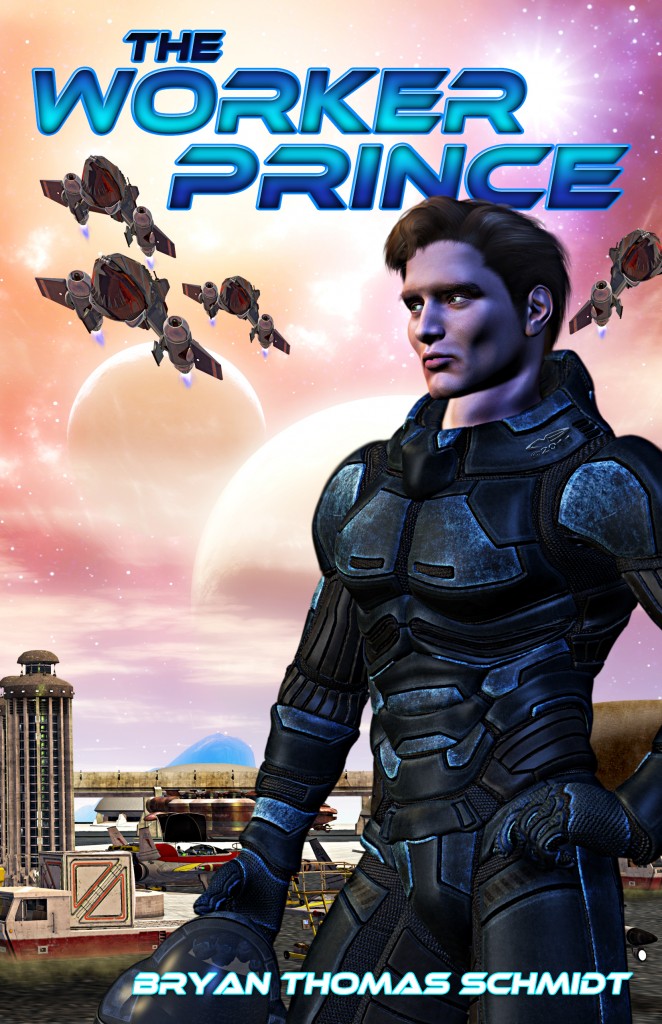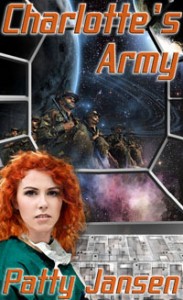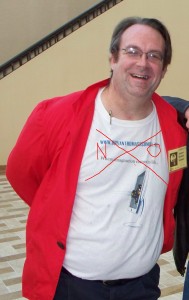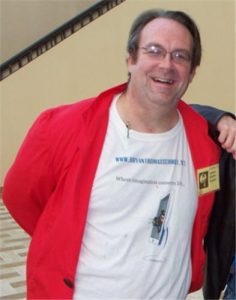 Well, we’re four chapters from finalizing the editing of my novel, The Returning, sequel to my debut The Worker Prince. ARCS will go out next week, and then copyediting. As I look at this book, a book which I’m amazed even got written–written in the midst of my life completely falling apart (unemployment, mental health issues and hospitalization for the wife, then divorce and a cross country relocation), I also marvel at how well this second book actually works. I know, I know: “We’ll be the judge of that” you’re thinking. And yes, you will. But from beta readers to editors, responses have been encouraging. They comment that it starts out fast like a Bourne movie and never lets up. They talk of the stakes being upped on every level from character development to complexity of plot to emotional arcs and actual events of the story. The stakes were higher in every way. And although that was deliberate in part, I find myself pondering how important second books are for us as authors and in trilogies generally. And how hard they can be to write.
Well, we’re four chapters from finalizing the editing of my novel, The Returning, sequel to my debut The Worker Prince. ARCS will go out next week, and then copyediting. As I look at this book, a book which I’m amazed even got written–written in the midst of my life completely falling apart (unemployment, mental health issues and hospitalization for the wife, then divorce and a cross country relocation), I also marvel at how well this second book actually works. I know, I know: “We’ll be the judge of that” you’re thinking. And yes, you will. But from beta readers to editors, responses have been encouraging. They comment that it starts out fast like a Bourne movie and never lets up. They talk of the stakes being upped on every level from character development to complexity of plot to emotional arcs and actual events of the story. The stakes were higher in every way. And although that was deliberate in part, I find myself pondering how important second books are for us as authors and in trilogies generally. And how hard they can be to write.
When I started The Returning, I had no idea what the book would be. I knew where the story would have to go for the ending in book 3. But unlike Book 1, which employed the biblical story of Moses as a framework, and book 3, which will also employ more elements of that, book 2 had to fill in gaps and required me to create more of my own storyline and structure with these characters. I knew there were mistakes I’d made in The Worker Prince which I didn’t want to repeat. I also knew there were things I wanted to do with the characters. But I wrote in total chaos. Outlining a chapter at a time is usual for me, so that’s not what I mean. What I mean is that my life was so chaotic in the background of writing that I often went a month or weeks between chapters or even scenes. Coming back to it, I found concentration hard, so I couldn’t review what I’d written as fully. And often I didn’t want to reread the previous six chapters just to write. Unlike The Worker Prince, this book took 9 months to write. And it went out a chapter at a time to three beta readers as I went. They urged me for more quite often. Their patience was greatly appreciated. I didn’t look at their feedback until after I’d finished.
I was amazed.
First of all, as I hinted at above, I’m a pantser. I let the story go where it takes me. I always have some key plot points in mind. And I always have a rough idea of the base storylines (plots and subplots). But in this case, I had no idea how I would end it until I was well over 2/3rds through. It’s a middle book. There was no real ending. Many events in this book carry over into Book 3. But at some point, I realized I could still create a satisfying denouement, even if it was a cliffhanger ending. And the book most certainly has that. At the same time, the events push toward the point where a chapter feels closed in spite of that.
Early on I realized Book 2 needed a sense of everything being turned upside down. The Worker Prince was a happy story overall. It almost feels like a standalone. Despite the survival of the antagonists and potential for more stories, everything gets wrapped up in a pretty happy ending. But for the characters to progress and the story with them, I needed to tear all the stability and happiness apart again. Their lives, relationships and future all needed to be in jeopardy, and readers needed to be surprised. So, as I wrote, I set that goal. In addition, I wanted a fast pace, action packed novel, both emotionally and physically. It required a more complicated plot. And wound up with seventeen point of view characters, a hell of a cast to manage. (Some only have a scene or two from their POV. There are major POV characters who have scenes throughout as well.)
As I reached each plot point I’d planned, I examined my options and looked for the unusual choice, the surprise twist. What could happen here that would make readers say: “Whoa! I cannot believe that just happened!” Where can I take things that makes it more complicated and pushes them further from their goals and happiness again? At every chance, I made such choices. Unlike The Worker Prince, I knew that meant important characters would have to die. In the end, four do.
It’s hard to kill characters. You spend so much time with them that you begin to feel a bit like they’re family. So killing them, unless you’re psychopathic I suppose, feels wrong and mean. Who wants to be mean? But in order for the heights of the emotional arcs and plots to be reached, the stakes had to get higher and higher in The Returning, and I found no way to do that without endangering characters. In choosing the characters to subject to this “cruelty,” I also tried to make surprising choices. I chose characters I liked but characters who, ultimately, have less interesting arcs left to them than the ones who remained. My readers may disagree, but I hope not. Because the deaths of these characters actually redefine and energize the arcs for other characters in Book 3. They serve to drive the rest of the story.
I also did more exploration of my solar system, using more alien species and worlds, and exploring more of how the Boralian Alliance got to be in control and treated the natives they encountered. This will be a big part of Book 3 as well, and I think it made for some very interesting worldbuilding along with some nice plot twists and turns.
Obviously, I can’t say too much. The book doesn’t release until June. But in any case, by the time I concluded writing The Returning, I knew I had the makings of a very satisfying chapter in my saga. In fact, editors and my beta readers all agreed it’s a better book on every level than The Worker Prince. [That’s a compliment writers. We need to grow with each book. So I took it that way. It was also my goal as mentioned above.]
And so now I can’t wait to share it with you. It goes out to reviewers and other authors for blurbs next week. I have some pretty cool people lined up, including a couple of Star Wars authors. I can’t wait to hear what they think. I hope you’ll take the time to read The Worker Prince and The Returning and love them as much as I loved the experience of bringing them to life for you.
For what it’s worth…
 Bryan Thomas Schmidt is the author of the space opera novel The Worker Prince, a Barnes & Noble Best SF Releases of 2011 Honorable Mention, the collection The North Star Serial, Part 1, and has several short stories forthcoming in anthologies and magazines. His second novel, The Returning, is forthcoming from Diminished Media Group in 2012. He’s also the host of Science Fiction and Fantasy Writer’s Chatevery Wednesday at 9 pm EST on Twitter, where he interviews people like Mike Resnick, AC Crispin, Kevin J. Anderson and Kristine Kathryn Rusch. A frequent contributor to Adventures In SF Publishing, Grasping For The Wind and SF Signal, he can be found online as @BryanThomasS on Twitter or via his website. Excerpts from The Worker Prince can be found on his blog. Bryan is an affiliate member of the SFWA.
Bryan Thomas Schmidt is the author of the space opera novel The Worker Prince, a Barnes & Noble Best SF Releases of 2011 Honorable Mention, the collection The North Star Serial, Part 1, and has several short stories forthcoming in anthologies and magazines. His second novel, The Returning, is forthcoming from Diminished Media Group in 2012. He’s also the host of Science Fiction and Fantasy Writer’s Chatevery Wednesday at 9 pm EST on Twitter, where he interviews people like Mike Resnick, AC Crispin, Kevin J. Anderson and Kristine Kathryn Rusch. A frequent contributor to Adventures In SF Publishing, Grasping For The Wind and SF Signal, he can be found online as @BryanThomasS on Twitter or via his website. Excerpts from The Worker Prince can be found on his blog. Bryan is an affiliate member of the SFWA.
19 5-star & 4-star reviews THE WORKER PRINCE $4.99 Kindle http://amzn.to/pnxaNm or Nook http://bit.ly/ni9OFh $14.99 tpb http://bit.ly/qIJCkS.






 Recent press coverage of Bryan, The Worker Prince, and the free signing from 1-4 pm on Saturday, February 4th, 2012 being held at Hastings, 1900 W. 23RD, Lawrence, KS 66046, can be found at
Recent press coverage of Bryan, The Worker Prince, and the free signing from 1-4 pm on Saturday, February 4th, 2012 being held at Hastings, 1900 W. 23RD, Lawrence, KS 66046, can be found at 
